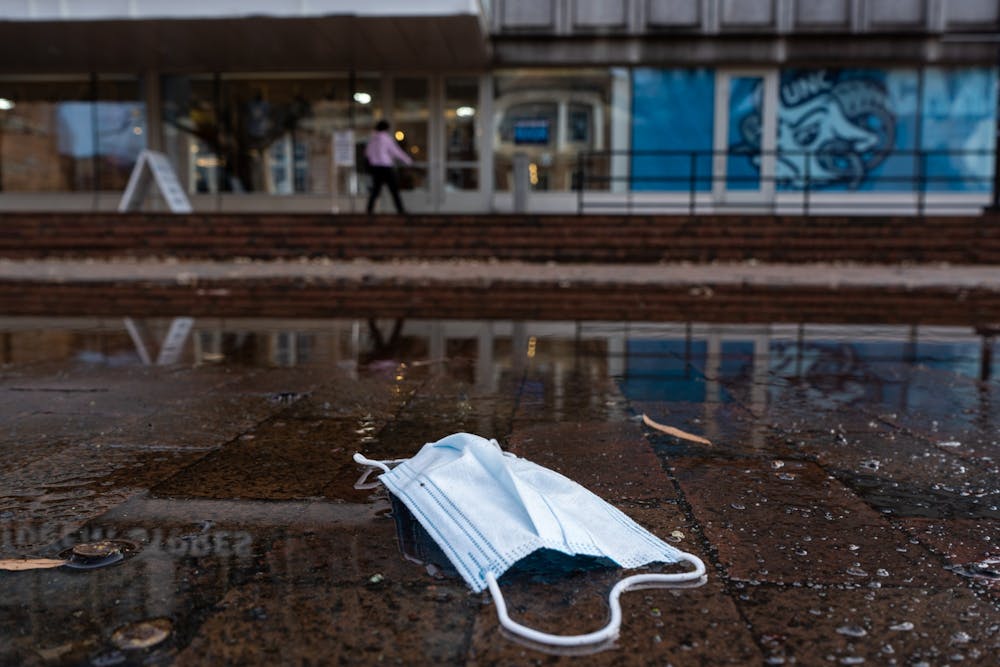University policy changes
After the campus mask mandate was lifted, the University implemented other changes in response to recent COVID-19 data trends.
This month, when the the University's dashboard stopped updating, it was replaced with a compilation of external dashboards.
"The on-campus positivity rate has remained low the last few weeks, averaging less than 3%, and the number of cases has declined locally as well," the April 6 campuswide email read.
Other changes include reduced hours through the Carolina Together Testing Program, which were made effective on March 14. The Student Union testing site is now only open Monday, Wednesday and Friday.
Testing has also transitioned to walk-in only, rather than by appointment — which was required for students at the beginning of the semester.
A possible resurgence
Justin Lessler, a professor in the Gillings School of Global Public Health's Department of Epidemiology, has been involved with COVID-19 research since January 2020.
Lessler was one of the authors on the Jan. 4 planning brief put together by UNC researchers, including epidemiologists Jessie Edwards andAudrey Pettifor, and assistant geography professor and Carolina Population Center fellow Paul Delamater.
The brief projected that campus infections would peak two to three weeks into the spring semester, with 850 to 1,650 infections per day.
UNC reported 838 positive cases among students during the week ending on Jan. 9 on the dashboard. That week, the one-day student case record was 185 positive tests. That daily positive case record climbed to a total of 240 students by Jan. 19 before trending downward.
National and local COVID-19 trends have declined throughout the spring, Lessler said, up until very recently.
To get the day's news and headlines in your inbox each morning, sign up for our email newsletters.
“We're starting to see a bit of a resurgence, which I think has to do with both the impact of the BA.2 variant, and a pretty big effect of behavior change as mask mandates become less prevalent,” Lessler said.
For the week ending April 9, the N.C. Department of Health and Human Services reported 323 cases for Orange County, more than double from the previous week’s report of 111.
The BA.2 variant, a subvariant of omicron, currently dominates global case numbers. Compared to other strains, vaccines are less effective against the BA.2 variant, and it has been shown to be connected to recent surges in other countries.
Safety strategies
The CDC guidelines for community COVID-19 safety are now focused on analyzing hospitalization numbers, as opposed to test count and positivity rate.
Lessler said this decision is justified for two reasons: Community testing has shifted to at-home or clinician’s offices with a focus on rapid testing, and the severity of infection waves has decreased as populations build immunity.
“It makes sense to really focus on the hospitalizations and the severe outcomes, because we don't want to be shutting everything down based on what is essentially a wave of mild illness,” he said.
Lessler said that while large events like students rushing Franklin Street can contribute to the spread of COVID-19, they are not the only factor.
“I think that those things can be seeding events, but I do think it's more maintained behavior that is likely to keep the epidemic going,” he said.
Looking forward
In the case of a resurgence, Lessler said, he hopes the University would be willing to reinstate some of its safety policies that helped keep community members safe in previous semesters.
UNC Media Relations said in an email that the University determines its community standards based on the UNC System, state and local guidelines.
“We are continuously monitoring local conditions and will continue to consult with system leadership and local health leaders in determining additional changes,” the email read.
As an epidemiologist, Lessler said, he is mainly concerned with the spread of the disease, but he recognizes that the county and University have various priorities they have to balance.
“Caution doesn’t have to be mandated,” Lessler said. “As we see cases rise, I think people should be considering their safety and those around them and being a little bit more cautious in the coming weeks."
@laynanhong
university@dailytarheel.com



